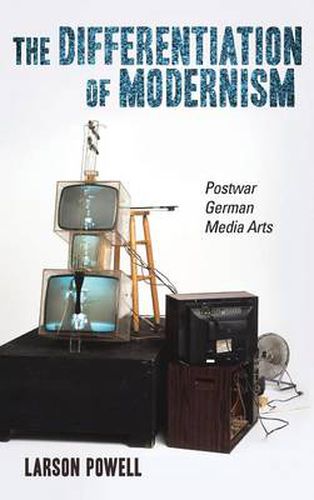Readings Newsletter
Become a Readings Member to make your shopping experience even easier.
Sign in or sign up for free!
You’re not far away from qualifying for FREE standard shipping within Australia
You’ve qualified for FREE standard shipping within Australia
The cart is loading…






After 1945, the purist medium specificity of high modernism increasingly yielded to the mixed forms of intermediality. Theodor Adorno dubbed this development a Verfransung, or fraying of boundaries, between the arts. TheDifferentiation of Modernism analyzes this phenomenon in German electronic media arts of the late modernist period (1945-80): in radio plays, film music, and electronic music. The first part of the book begins with a chapter on Adorno’s theory of radio as an instrument of democratization, going on to analyze the relationship of the Hoerspiel or radio play to electronic music. In the second part, on film music, a chapter on Adorno and Eisler’s Composing for the Film sets the parameters for chapters on the film Das Madchen Rosemarie (1957) and on the music films of Jean-Marie Straub and Daniele Huillet. The third part examines the music of Karlheinz Stockhausen and its relationship to radio, abstract painting, recording technology, and theatrical happenings. The book’s central notion of the differentiation of culture suggests that late modernism, unlike high modernism, accepted the contingency of modern mass-media driven society and sought to find new forms for it.
Larson Powell is Curator’s Professor of Film Studies at University of Missouri, Kansas City. He is the author of The Technological Unconscious in German Modernist Literature (Camden House, 2008).
$9.00 standard shipping within Australia
FREE standard shipping within Australia for orders over $100.00
Express & International shipping calculated at checkout
After 1945, the purist medium specificity of high modernism increasingly yielded to the mixed forms of intermediality. Theodor Adorno dubbed this development a Verfransung, or fraying of boundaries, between the arts. TheDifferentiation of Modernism analyzes this phenomenon in German electronic media arts of the late modernist period (1945-80): in radio plays, film music, and electronic music. The first part of the book begins with a chapter on Adorno’s theory of radio as an instrument of democratization, going on to analyze the relationship of the Hoerspiel or radio play to electronic music. In the second part, on film music, a chapter on Adorno and Eisler’s Composing for the Film sets the parameters for chapters on the film Das Madchen Rosemarie (1957) and on the music films of Jean-Marie Straub and Daniele Huillet. The third part examines the music of Karlheinz Stockhausen and its relationship to radio, abstract painting, recording technology, and theatrical happenings. The book’s central notion of the differentiation of culture suggests that late modernism, unlike high modernism, accepted the contingency of modern mass-media driven society and sought to find new forms for it.
Larson Powell is Curator’s Professor of Film Studies at University of Missouri, Kansas City. He is the author of The Technological Unconscious in German Modernist Literature (Camden House, 2008).